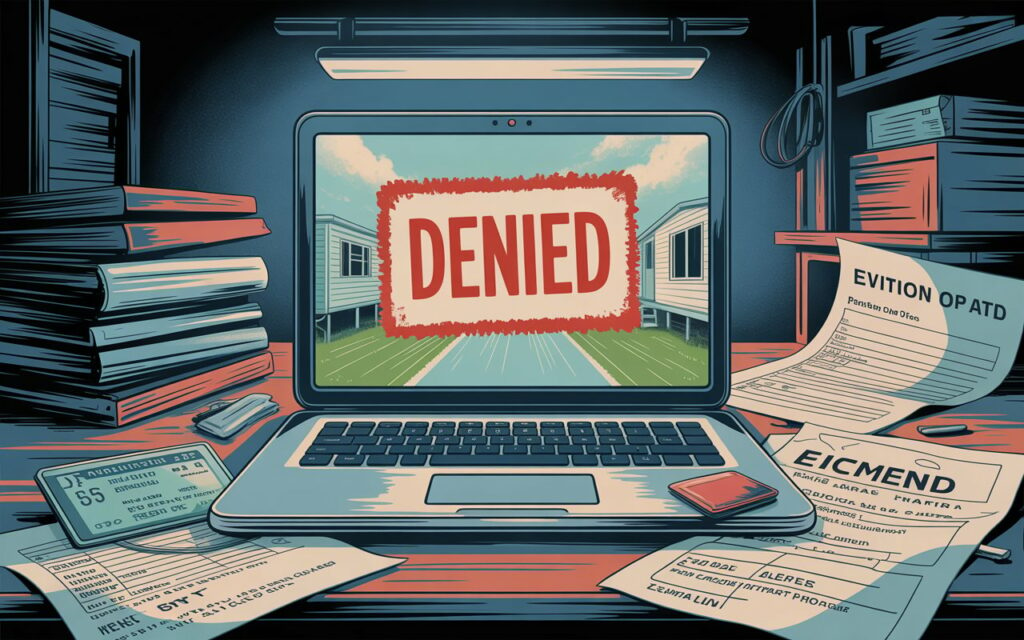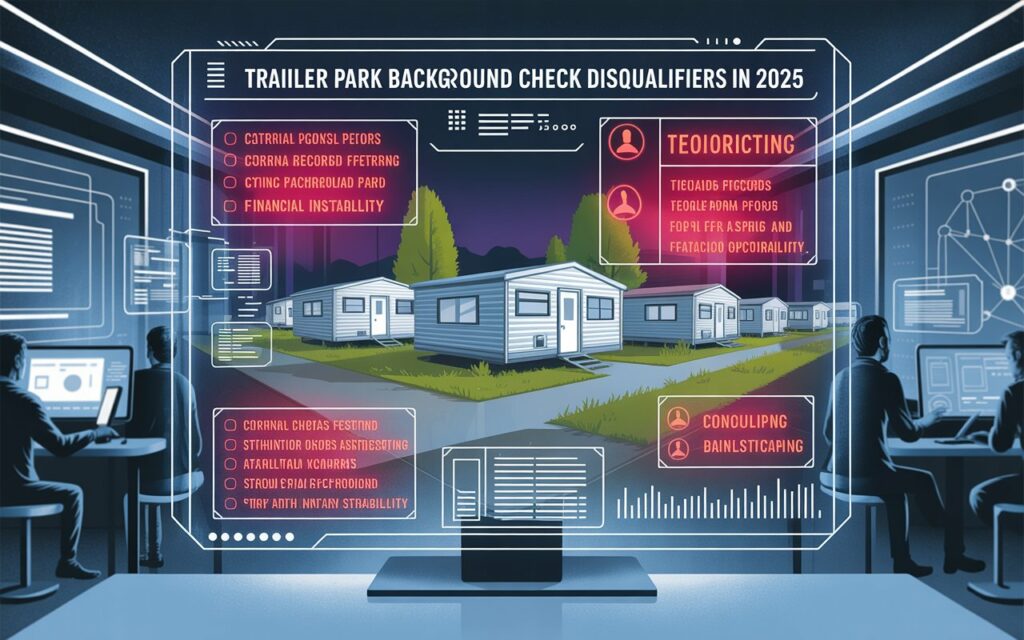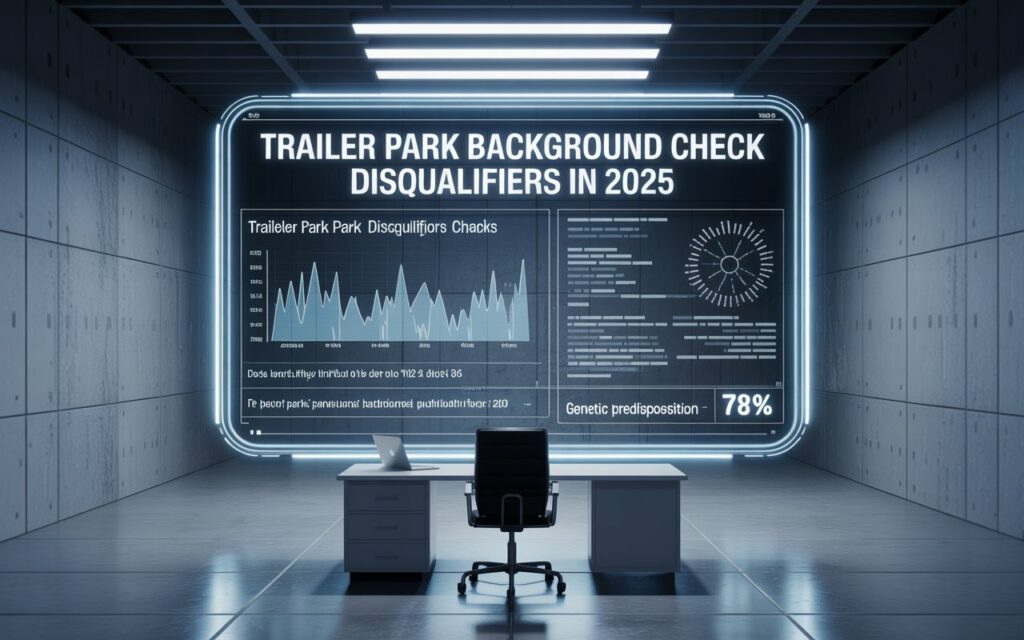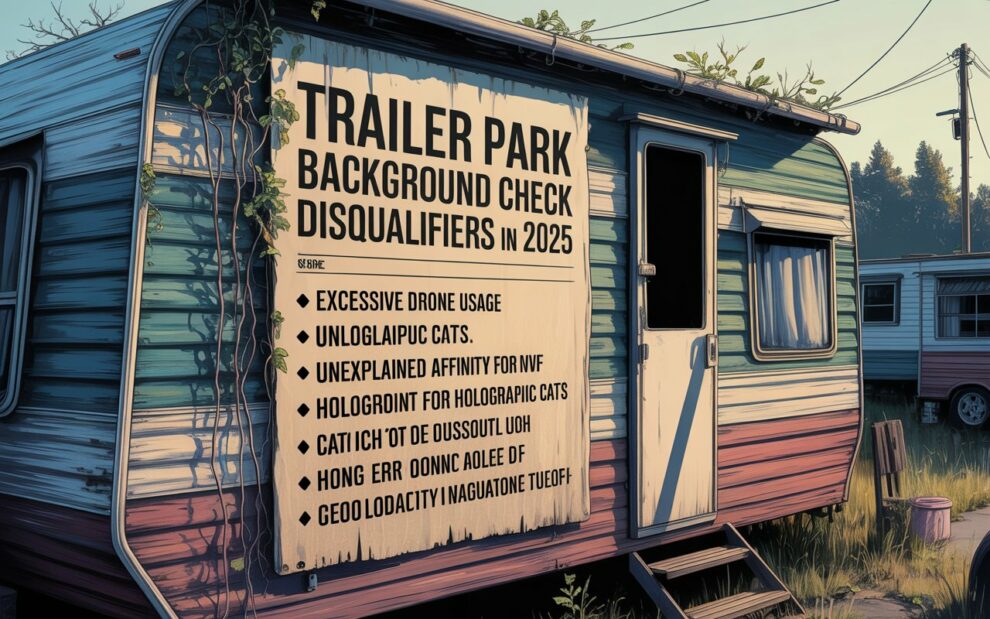Discover the Top Trailer Park Background Check Disqualifiers in 2025—and What You Can Do to Overcome Them Before You Apply.
Table of Contents
In 2025, trailer parks—also known as manufactured home communities—are not just affordable housing options; they’re regulated environments that prioritize community safety and legal compliance. Whether owned by a private landlord or managed by a larger real estate investment group, most trailer parks in the United States now conduct comprehensive background checks before approving new tenants.
The rise in demand for affordable housing, coupled with updated tenant screening laws and digital verification tools, means applicants must pass specific background criteria to qualify for residency. This blog explores the common trailer park background check disqualifiers in 2025, how they align with federal and state laws, and what applicants need to know to avoid denial.
What Does a Trailer Park Background Check Include in 2025?
By 2025, trailer park management companies typically conduct Level 1 or Level 2 background checks depending on the community’s policies. However, some higher-end or senior-only communities may implement Level 3 screening. The following components are commonly reviewed:
- Criminal History (local, state, national)
- Sex Offender Registry Checks
- Eviction History
- Credit Report & Debt Review
- Income and Employment Verification
- Rental History References
- Identification and SSN Validation
Most checks are processed through automated tenant screening platforms integrated with Fair Credit Reporting Act (FCRA)-compliant databases.
Common Trailer Park Background Check Disqualifiers

While trailer park screening processes vary, the following disqualifiers are among the most common across the country:
1. Felony Convictions
Most parks do not impose blanket bans on felonies due to fair housing laws, but some convictions typically lead to denial:
- Violent crimes (e.g., assault with a weapon, murder, aggravated robbery)
- Drug trafficking or manufacturing charges
- Arson or property destruction
- Crimes involving children (e.g., child abuse, exploitation)
In 2025, many states enforce “relevance-based” screening, meaning property managers must show that the offense directly threatens community safety.
2. Registered Sex Offender Status
Virtually all trailer parks in 2025 will disqualify applicants listed on any sex offender registry, especially if the park has children or vulnerable residents on site.
Under federal law (including the 2025 HUD updates), refusing tenancy based on registered sex offenses is generally allowed if the community can demonstrate risk mitigation.
3. Recent Evictions or Lease Violations
Eviction records from the past 3 to 5 years may result in denial, especially if they involved:
- Non-payment of rent
- Property damage
- Disturbance complaints
- Breach of lease terms
Some states now have Clean Slate laws that seal older eviction records, but many landlords still factor in recent eviction-related judgments when screening.
4. Low Credit Score or High Debt
While credit score requirements vary, many parks use them as a financial reliability indicator. Red flags include:
- Credit scores below 550
- High levels of unpaid utility or rent debt
- Recent bankruptcy filings without resolution
However, under FCRA 2025 amendments, applicants must receive a notice and chance to dispute inaccurate credit data before denial.
5. Inadequate Income or Unverifiable Employment
Most trailer parks require that rent does not exceed 30–35% of monthly income. Applicants may be disqualified if:
- They fail to provide proof of steady income
- Employment cannot be verified through official documentation or digital employment platforms
- Income sources appear fraudulent or inconsistent
Some communities allow cosigners or additional deposits in these cases, especially for seniors or low-income tenants.
6. False or Incomplete Application Information
Falsifying information on the rental application can lead to automatic disqualification. This includes:
- Fake employment details
- Misrepresenting criminal history
- Using false identity or Social Security Number
In 2025, AI tools used by landlords can now cross-check identity, employment, and rental history almost instantly, flagging suspicious patterns or forged documents.
7. Negative Rental References
Applicants with a history of:
- Lease violations
- Poor maintenance behavior
- Threats or violence toward neighbors or staff
- Frequent late payments
…may be disqualified even if other parts of the background check pass.
In 2025, many trailer parks use centralized landlord reference databases, which maintain records of tenant behavior and prior disputes.
The Impact of Criminal Records on Trailer Park Applications

Criminal history is one of the most scrutinized aspects of trailer park background checks in 2025. While federal and state laws discourage blanket bans, parks often deny applicants based on convictions related to safety, drugs, or violence.
Landlords are expected to follow the HUD 2025 guidance, which mandates individualized assessments. This includes considering:
- Time elapsed since the conviction
- Evidence of rehabilitation or clean record since
- Relevance to housing safety
- Whether the applicant poses a direct risk to residents
Even so, violent felonies, sex crimes, and drug manufacturing charges often result in disqualification due to the serious nature of these offenses.
Understanding Financial History Requirements in Trailer Park Rentals
In 2025, trailer park landlords place a strong emphasis on financial responsibility as part of their tenant screening process. Given the rising use of AI-powered screening tools, applicants must meet certain financial benchmarks to be considered low-risk tenants:
- Stable income: Most trailer parks require proof of a steady income that is at least three times the monthly rent. This helps ensure the tenant can meet rent obligations without hardship.
- Credit standing: A credit score of 600 or higher is generally preferred. Credit reports reflect patterns of debt repayment, credit usage, and financial responsibility.
- Bankruptcy history: While not always disqualifying, recent bankruptcies—especially those that remain unresolved—may raise red flags. Discharged bankruptcies with supporting documentation of improved financial behavior may be more acceptable.
- Debt-to-income ratio: High levels of outstanding debt relative to income may signal an increased risk of missed rent payments.
- Outstanding judgments: Unresolved judgments, especially those involving previous landlords or utility providers, often trigger denial in automated systems used by trailer parks to assess risk.
How Rental History Influences Approval in Trailer Parks
Rental history serves as a key predictor of future behavior. Trailer park managers and property owners evaluate applicants based on past interactions with landlords and adherence to rental agreements. Specific criteria include:
- Positive landlord references: Good references from former landlords, especially those who managed similar properties, can greatly strengthen an application.
- On-time payment history: A consistent record of paying rent on time demonstrates reliability and financial discipline.
- Eviction history: Most trailer parks will deny applicants who have been evicted within the past five to seven years, particularly if the eviction involved non-payment or lease violations.
- Compliance with park rules: Respect for property rules—such as maintaining cleanliness, controlling noise levels, and properly disposing of waste—is critical. Past violations recorded by landlords or in tenant screening databases can jeopardize approval.
Tips for Improving Your Chances of Passing a Background Check for Trailer Park Living

Applicants who are concerned about passing a background check can take proactive steps to improve their standing:
- Run a Self-Check: Before applying, review your own background using services like MyBackgroundCheck.com or free annual credit report providers. This helps identify issues before a landlord does.
- Disclose Upfront: If you have negative marks in your history, being transparent and submitting a written explanation along with supporting documents (such as rehabilitation certificates or proof of repayment) can influence decision-makers.
- Fix Credit Issues: Paying down existing debt, disputing errors on your credit report, and establishing a history of on-time payments can improve your credit score.
- Gather Strong References: Personal and professional references—particularly from previous landlords—can offset concerns raised by automated screening systems.
- Showcase Stability: Demonstrating consistent employment, community involvement, or long-term residence in prior housing can signal stability to potential landlords.
Fair Housing Compliance and Tenant Rights in 2025
All trailer park owners and property managers must comply with the Fair Housing Act and the Fair Credit Reporting Act (FCRA). In 2025, this means:
- No blanket bans: Landlords cannot automatically reject applicants based solely on criminal records. They must evaluate each case individually.
- Individualized assessments: Applicants must be assessed based on the relevance of any criminal history to the specific rental context, considering time since the offense, rehabilitation, and job stability.
- Pre-adverse action notices: If a landlord plans to deny an application based on a background check, they must first issue a pre-adverse action notice, including a copy of the background report used.
- Right to dispute: Applicants have the right to correct or dispute inaccuracies in their background checks before a final decision is made.
FAQs About Trailer Park Background Checks in 2025
Do all trailer parks run background checks?
Most do, especially professionally managed communities. Smaller parks or private owners may not require them—but it’s becoming more common.
Can I be denied housing for a misdemeanor?
Possibly, if it’s recent and involves violence, drugs, or property damage. But most misdemeanors are not automatic disqualifiers.
How far back does the check go?
Most parks review the past 7 years. Some states limit how long negative records can be used in housing decisions.
What if my record is sealed or expunged?
Sealed or expunged records should not appear in a compliant background check. If they do, you can file a dispute with the screening company.
Can I appeal a denial?
Yes. Under the FCRA, you’re entitled to dispute inaccurate information and request a reassessment of your application.
Conclusion
In 2025, trailer park background checks are a critical step in ensuring community safety and financial stability. While disqualifiers vary by state and community, applicants should prepare by reviewing their history, being transparent, and meeting all income and documentation requirements. With proper planning and awareness of their rights, tenants can improve their chances of approval—even in a more digitally regulated and competitive housing environment.
Do Follow Dragcast on Social Media For More Such Content.












Add Comment